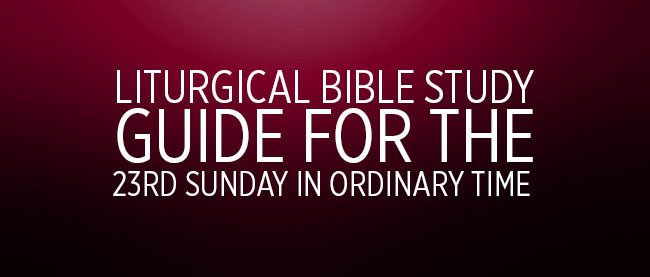1st Reading – Wisdom 9:13-18b
The Book of Wisdom is unique in the Bible as being the product of a Greek frame of mind, for the author is a Hellenized Jew, thoroughly familiar with Greek culture, writing probably at Alexandria in about 50 B.C.
Against the background of Egyptian worship of animals and mockery of Jewish trust in God, the author devotes much of the first part of the book to the ineffectiveness of such mockery when God has promised immortality to those who remain faithful. Using Greek modes of thought, he is the first to express the hope of after-life in terms of immortality of the individual soul. In the 2nd section of the book Solomon, the master of wisdom (to whom authorship of the book is conventionally attributed), speaks in praise of Wisdom. This reaches its high point in the descriptions of Wisdom as God’s own power at work in the world. The third section of the book is devoted to a rather flowery history, concentrating chiefly on the ineffective opposition of the Egyptians to God’s people at the time of the Exodus. Using Jewish legends and other amplification of the biblical account, the author points a contrast between the wonders God worked for Israel and the adverse effect of the same wonders on the Egyptians, stressing constantly the folly of Egyptian worship of animals and idols.
Perhaps the single-most important contribution of the book consists in its reflections on Wisdom, and especially the personification of Wisdom as God’s agent in the world, yet sharing intimately in His nature. The ground is prepared for the understanding of Jesus as the incarnate Wisdom of God. It is also valuable to see Judaism beyond the frontiers of Palestine, at grips with the varied worship of the Greco-Roman world, and to see it developing such ideas as that of the individual as a child of God. Because it was written after 400 B.C. and in Greek, the Book of Wisdom is not in the Hebrew canon of Scripture, and consequently it does not appear in the Protestant Bibles.
Today we hear the conclusion of Solomon’s prayer for Wisdom.
2nd Reading – Philemon 9-10, 12-17
Philemon was a wealthy Colossian; a personal friend of Paul, who had converted him to the faith. He had a slave called Onesimus (O-nis-see-mus), who robbed his master and fled to Rome where he hoped to escape capture by disappearing into the large population. The grace of God led the poor runaway slave to the prison-house of St. Paul. The apostle took compassion on him, received him with tenderness, and won him for Christ. Then he sent him back to his master in Colossae with a letter to plead for him – not only to save him from a severe penalty, but to ask for him to be shown sympathy, affection, and Christian brotherhood. It is this appeal that we hear today.
The result of the appeal cannot be doubted. Tradition has it that Onesimus became bishop of Ephesus and suffered martyrdom in Rome about the same time as St. Ignatius of Antioch (AD 109-110).
Gospel – Luke 14:25-33
People are now streaming from all the streets and lanes. The poor and the maimed and blind and lame now cured (v21) form great crowds surrounding Jesus. In last week’s reading Jesus had told the crowd that attendance at the heavenly banquet depends upon an invitation from God, and God invites those who recognize their lowliness and their need of salvation. Jesus now demands total dedication from His disciples.


